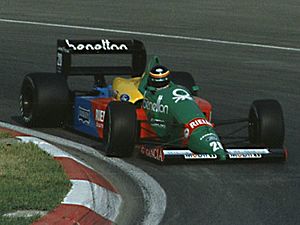Benetton Formula facts for kids
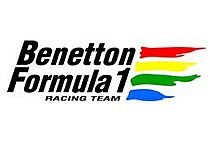 |
|
| Full name | Benetton Formula Ltd. |
|---|---|
| Base | Witney, England, UK (1986–1991) Enstone, England, UK (1992–2001) |
| Noted staff | Flavio Briatore Rocco Benetton Ross Brawn Frank Dernie Mike Gascoyne Nigel Stepney Pat Symonds Steve Matchett David Richards Peter Collins Rory Byrne Nikolas Tombazis Willem Toet Pat Fry Nick Wirth John Barnard Philip J. Henderson Greg Field |
| Noted drivers | |
| Previous name | Toleman Motorsport |
| Next name | Renault F1 Team |
| Formula One World Championship career | |
| First entry | 1986 Brazilian Grand Prix |
| Races entered | 260 |
| Engines | BMW, Ford, Renault, Playlife |
| Constructors' Championships |
1 (1995) |
| Drivers' Championships |
2 (1994, 1995) |
| Race victories | 27 |
| Podiums | 102 |
| Points | 851.5 (861.5) |
| Pole positions | 15 |
| Fastest laps | 36 |
| Final entry | 2001 Japanese Grand Prix |
Benetton Formula Limited, often called simply Benetton, was a Formula One racing team. It competed in Formula One from 1986 to 2001. The team was owned by the Benetton family, famous for their clothing stores worldwide.
In 2000, the Renault car company bought the team. However, it kept the Benetton name for the 2000 and 2001 seasons. In 2002, the team officially became the Renault F1 Team.
Contents
Team History
How Benetton Started
The Benetton Group first joined Formula One as a sponsor. They sponsored the Tyrrell team in 1983. Then they sponsored Alfa Romeo in 1984 and 1985. Finally, they sponsored the Toleman team in 1985.
Toleman had a tough year in 1985. They missed the first three races. They could only enter one car for the next six races. This was due to problems with their tire suppliers. Even though Teo Fabi got a pole position at the German Grand Prix, the team scored no points that season. Their cars often broke down. Benetton Formula Limited was created in 1985 when the Toleman team was sold to the Benetton family.
Early Years: BMW and Ford Engines (1986–1994)
First Races (1986–1987)
Toleman had already designed a car for the 1986 season. It was called the TG186. After Benetton took over, it was renamed the Benetton B186. Benetton also changed engine suppliers. They switched from Hart engines to powerful BMW M12 engines.
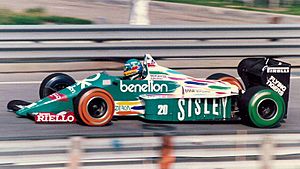
The B186 car was very fast. Gerhard Berger got the team's first podium finish at Imola. He also started from the front row in Belgium. Teo Fabi earned two pole positions in Austria and Italy. Berger then won the team's first race in Mexico. He finished almost 30 seconds ahead of the next car.
However, the B186 often broke down. The team had 19 retirements, meaning cars had to stop racing. Fabi had eight retirements in a row, even from his pole positions. Benetton finished 6th in the championship with 19 points.
Berger left for Ferrari at the end of 1986. Thierry Boutsen replaced him. BMW stopped supplying engines to Benetton in 1987. Benetton then got engines from Ford. The B187 car had engine problems early in 1987. But it became more reliable later in the season. It finished 4th and 5th many times. It also got two 3rd places in Austria and Australia. Benetton finished 5th in the championship with 28 points.
Growing Stronger (1988–1990)
For 1988, Alessandro Nannini joined Benetton, replacing Fabi. The B188 was the team's first car with a naturally-aspirated engine. This meant it didn't use a turbocharger. The B188 was even better than before. It broke down less often and earned seven 3rd-place finishes. Benetton finished 3rd in the championship with 39 points.
In 1989, Boutsen left. Rookie Johnny Herbert joined the team. Ford's new engine for the B189 car wasn't ready. So, the team had to use the older B188 car. Nannini still got a podium finish at Imola. Herbert had a serious crash before joining F1. He was replaced by Emanuele Pirro after failing to qualify for a race. The B189 car was finally ready later. Nannini then won Benetton's first race since 1986 at the Japanese Grand Prix. Benetton finished 4th in the championship with 39 points.
Before the 1990 season, Flavio Briatore became the team manager. Nelson Piquet, a three-time world champion, joined the team. Benetton used a changed B189 car before introducing the B190. 1990 was the team's best year so far. Piquet won the last two races. The team also got six other podium finishes. Sadly, Nannini had a helicopter crash and could no longer race in F1. Roberto Moreno replaced him. At the Japanese Grand Prix, Benetton had its first 1-2 finish, with Piquet first and Moreno second. Benetton finished 3rd in the championship with 71 points.
Schumacher's Early Years (1991–1993)
In 1991, Benetton got a new sponsor, Camel cigarettes. The team used an upgraded B190 car for the first two races. Then the B191 car debuted. Piquet won a race in Canada. This was unexpected after another driver retired on the last lap. Benetton wanted a young driver for the future. They hired Michael Schumacher after he impressed in his first race for Jordan. Schumacher joined Benetton for the next race.
For 1992, Tom Walkinshaw Racing bought a part of Benetton. The team also moved its base from Witney to a new factory in Enstone. Piquet retired, and Martin Brundle joined. Benetton's new car was delayed again. They used an upgraded B191 for the first three races. Schumacher got two podiums with it. The B192 was much better. It earned eleven more podiums, including Schumacher's first win at Spa-Francorchamps. Benetton finished 3rd in the championship with 91 points.
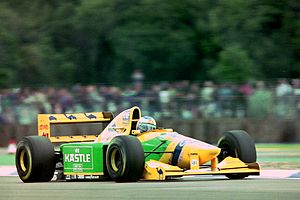
In 1993, Riccardo Patrese replaced Brundle. The B193 car was similar to the previous one. Schumacher won one race at the Portuguese Grand Prix. The team finished 3rd in the championship for the fourth time. Benetton also got ten other podium finishes. Even with these good results, Benetton couldn't give Schumacher a car to win the world championship. The Williams team was too strong.
Championship Wins (1994–1995)
In 1994, Mild Seven cigarettes became the main sponsor. Benetton cars turned sky blue. Patrese retired, and JJ Lehto joined. However, Lehto was injured before the season. Benetton's test driver Jos Verstappen replaced him. The B194 car was very strong with Schumacher. He won six of the first seven races. He also got Benetton's first pole positions since 1986. Verstappen and Lehto had less success.
Schumacher was disqualified from the British Grand Prix for passing a car illegally. He was also banned for two races. At the German Grand Prix, Verstappen's car caught fire during a pit stop. He was okay with minor burns. He then got two podiums in the next races. Schumacher was disqualified again at the Belgian Grand Prix for a car part being too worn. Benetton replaced Verstappen with Johnny Herbert for the last two races. Schumacher won his first world title after a crash with Damon Hill in the final race.
Car Software Investigation (1994)
During the 1994 season, some rival teams thought Benetton might be using illegal electronic aids. These included systems like traction control and launch control, which were banned by the FIA. The FIA investigated and found "start sequence" software in the Benetton B194 cars. They also found similar software in other teams' cars.
The FIA found no proof that Benetton had actually used the software during races. Because of this, teams found with the software received little or no punishment. No traction control software was found in Benetton's cars. Flavio Briatore, Benetton's boss in 1994, said later that "Our only mistake was that at the time we were too young and people were suspicious."
Renault Engines (1995-1997)
After eight years with Ford, Benetton switched to full-factory Renault V10 engines for 1995. Herbert stayed with Schumacher. Schumacher initially didn't like the new B195 car. He said it was hard to control. The Williams FW17 car was better early in the season. Schumacher even crashed from pole position at Imola.
However, after some changes, Schumacher's performance improved. He then dominated the rest of the season. He won nine races out of seventeen and claimed his second world title. Herbert got his first podium in Spain. He then won the British and Italian Grands Prix. This teamwork helped Benetton win its first constructors' championship. This ended Williams' three-year winning streak.
Team Changes and Decline (1996–1999)
Benetton started racing under an Italian license in 1996, but stayed in the UK. Schumacher left early to join Ferrari, even though he had a contract. Herbert also left. Jean Alesi and Gerhard Berger joined Benetton from Ferrari. Williams became dominant again in 1996. Ferrari also started winning races after Schumacher joined. Benetton struggled.
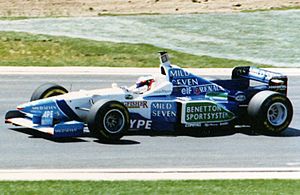
The B196 car got ten podium finishes. But the team didn't win a single race for the first time since 1988. Alesi and Berger were close to winning races. But both retired late in the races. Benetton finished 3rd in the championship with 68 points. This was less than half of their 1995 points.
By 1997, many key staff members had left Benetton to join Schumacher at Ferrari. The B197 car struggled against Williams and Ferrari. However, the team still got several podium finishes. Berger missed three races due to illness and a family loss. Rookie test driver Alexander Wurz replaced him. Wurz got a podium in Britain, in only his third F1 race. Berger returned and won the German Grand Prix from pole position. This was Benetton's last F1 victory. Alesi got pole position in Italy but finished 2nd. Benetton ended 1997 in 3rd place with 67 points.
Playlife Engines (1998-2000)
Many changes happened at Benetton in 1998. Berger retired, and Alesi left. Wurz became a full-time driver, partnering Giancarlo Fisichella. Renault stopped supplying engines directly. Benetton used Renault's 1997 engines, which were prepared by Mecachrome. Benetton renamed these engines "Playlife", a brand owned by the Benetton family.
Fisichella had some success with the B198 car. He got two 2nd places in a row in Monaco and Canada. He also got pole position in Austria. But Benetton became less competitive towards the end of the season. They scored only one point in the last seven races. Benetton finished 5th in the championship with 33 points.
In 1999, Rocco Benetton replaced David Richards as chief executive. The Renault engines were now developed by Flavio Briatore's Supertec company. But they were still called Playlife. The B199 car was a disappointment. Fisichella's 2nd place in Canada was the highlight. Benetton finished 6th in the championship with 16 points. This was their worst finish ever.
Renault Takes Over (2000–2001)
Before the 2000 season, Renault bought the Benetton team. Renault wanted to return to Formula One. However, the team kept the Benetton name. Renault brought back Flavio Briatore as team manager. The B200 car was better. It got three podium finishes, all by Fisichella. Benetton finished 4th in the championship with 20 points.
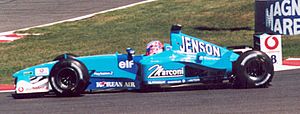
In 2001, the Renault name officially returned to F1. Benetton received full-factory Renault engines. Jenson Button replaced Wurz. Benetton had a very bad start to 2001. The B201 car often barely qualified for races. They scored only one point in the first eleven races. This was when Fisichella finished 6th in Brazil.
The team's luck started to change at the German Grand Prix. Fisichella and Button finished 4th and 5th. Benetton's car performance improved. Button and Fisichella scored 10 points for the team. Fisichella even got an impressive podium finish in Belgium.
Benetton's Legacy
2001 was the last season for the Benetton name. The team was fully renamed the Renault F1 Team for the 2002 season. The Renault F1 Team went on to win the drivers' and constructors' championships in both 2005 and 2006. This was with drivers Fernando Alonso and Giancarlo Fisichella.
The team was later sold and became the Lotus F1 Team in 2012. Renault bought the team back and renamed it Renault Sport Formula One Team in 2016. It then became the Alpine team in 2021. The team still operates from the factory in Enstone, England. This factory was first set up by Benetton in 1992.
The Benetton team is best known for its success with Michael Schumacher. He won 19 of the team's 27 race victories. He also won their two World Drivers' Championships.
Team Nationality
The Benetton team had a British license from 1986 to 1995. Then it changed to an Italian license from 1996 to 2001. This made it only the second team to officially change its nationality. The Benetton family wanted the team to represent their home country. At the 1997 German Grand Prix, Benetton became the only team to win races under more than one nationality. The team was always based in the UK. It started at the old Toleman factory in Witney, Oxfordshire. Then it moved to a new, bigger factory in Enstone in 1992.
Racing Results Summary
| Year | Name | Car | Engine | Tyres | No. | Drivers | Points | WCC |
|---|---|---|---|---|---|---|---|---|
| 1986 | B186 | BMW M12/13 L4t | P | 19. 20. |
19 | 6th | ||
| 1987 | B187 | Ford-Cosworth GBA 1.5 V6t | G | 19. 20. |
28 | 5th | ||
| 1988 | B188 | Ford-Cosworth DFR 3.5 V8 | G | 19. 20. |
39 | 3rd | ||
| 1989 | B188 B189 |
Ford-Cosworth DFR 3.5 V8 Ford HBA1 3.5 V8 Ford HBA4 3.5 V8 |
G | 19. 20. 20. |
39 | 4th | ||
| 1990 | B189B B190 |
Ford HBA4 3.5 V8 | G | 19. 19. 20. |
71 | 3rd | ||
| 1991 | B190B B191 |
Ford HBA4 3.5 V8 Ford HBA5 3.5 V8 |
P | 19. 19. 20. |
38.5 | 4th | ||
| 1992 | B191B B192 |
Ford HBA5 3.5 V8 Ford HBA7 3.5 V8 |
G | 19. 20. |
91 | 3rd | ||
| 1993 | B193 B193B |
Ford HBA7 3.5 V8 Ford HBA8 3.5 V8 |
G | 5. 6. |
72 | 3rd | ||
| 1994 | B194 | Ford ECA Zetec-R 3.5 V8 | G | 5. 5./6. 6. 6. |
103 | 2nd | ||
| 1995 | B195 | Renault RS7 3.0 V10 | G | 1. 2. |
137 | 1st | ||
| 1996 | B196 | Renault RS8 3.0 V10 | G | 3. 4. |
68 | 3rd | ||
| 1997 | B197 | Renault RS9 3.0 V10 | G | 7. 8. 8. |
67 | 3rd | ||
| 1998 | B198 | Playlife (Mecachrome) GC37-01 3.0 V10 | B | 5. 6. |
33 | 5th | ||
| 1999 | B199 | Playlife (Supertec) FB01 3.0 V10 | B | 9. 10. |
16 | 6th | ||
| 2000 | B200 | Playlife (Supertec) FB02 3.0 V10 | B | 11. 12. |
20 | 4th | ||
| 2001 | B201 | Renault RS21 3.0 V10 | M | 7. 8. |
10 | 7th |
More to Explore
- Benetton family
- Benetton Group
- List of Formula One constructors
See also
 In Spanish: Benetton Formula para niños
In Spanish: Benetton Formula para niños


